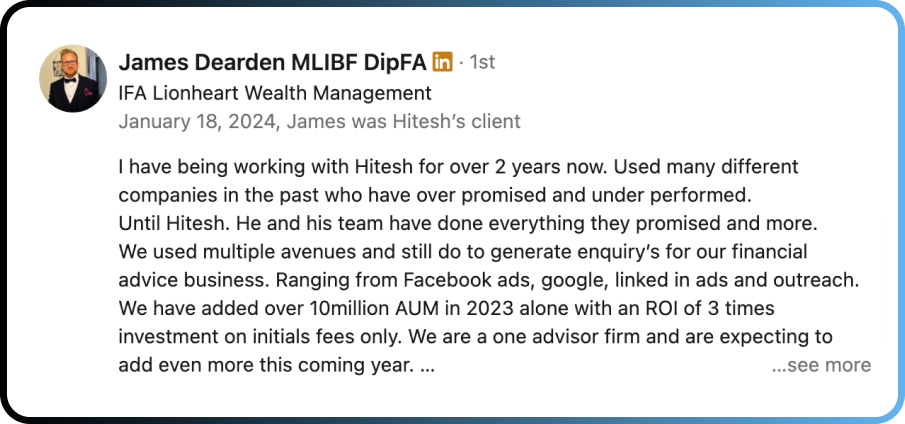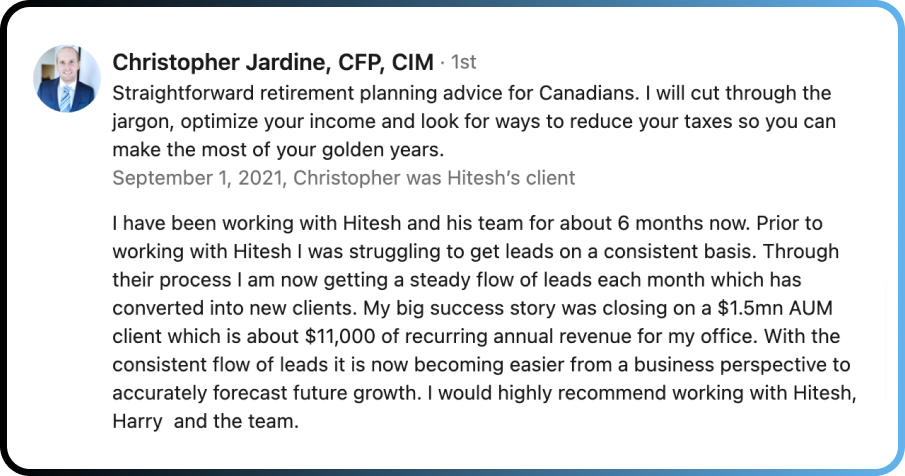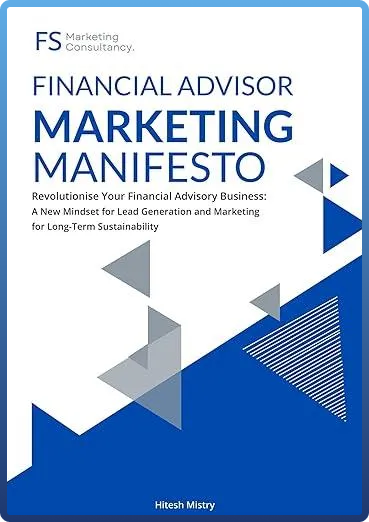We'll Install The Perfect Lead Gen System Into Your Business...
...So that you don’t need to worry where your next qualified lead is going to come from for the rest of your business life!
Speak to us about our single fee setup, no retainer offer!

Financial Services

Business to Business (B2B)

Software as a Service (SaaS)
A Lead Generation System Where Your Ideal Customers Hang Out!

Cold Email
We'll build an automated email outreach system that will get you in front of 10k+ ideal customers every single month.

Facebook Ads
We’ll help you harness the potential of Facebook ads to generate new, highly qualified leads.

LinkedIn Ads & Outreach
We’ll help you leverage the power of LinkedIn ads to generate new, highly qualified leads and create valuable connections.

Meet Hitesh!
We'll build an automated email outreach system that will get you in front of 10k+ ideal customers every single month.
I've been fortunate to work with companies all around the world across Financial Services, B2B and SaaS generating thousands of leads, appointments and demos, helping clients grow their revenue.
Got a question about lead gen?
Book a call below or connect with me directly on LinkedIn.
What They Say About Us


Recent Lead Generation System Results
Some example results from our Cold Email, Facebook, LinkedIn Ads & Outreach campaigns.
Our Latest Lead Gen Insights

How to Leverage Client Testimonials to Boost Your Advisory Business
In the financial advisory world, trust and credibility are the cornerstones of success. One of the most effective ways to build trust with prospective clients is through the use of client testimonials. Positive feedback from satisfied clients serves as powerful social proof that your services are effective, reliable, and valuable. Testimonials can help reassure prospects that you can deliver on your promises and guide them towards their financial goals.
In this blog, we’ll explore the importance of client testimonials and how financial advisors can leverage them to boost their business and attract new clients.
Why Client Testimonials Matter for Financial Advisors
Client testimonials provide a form of validation that marketing materials and advertising can’t always achieve. They are authentic, third-party endorsements that carry weight in the decision-making process of potential clients. In financial services, where trust is essential, testimonials help build credibility and demonstrate that you’ve successfully helped others with similar financial needs.
Key Benefits of Using Client Testimonials:
Builds Credibility: Testimonials give prospective clients confidence that others have had positive experiences working with you. It shows that your advice and services are trusted by people just like them.
Increases Conversion Rates: Research shows that people are more likely to engage with a business that has strong reviews or testimonials. By showcasing positive client feedback, you can increase your chances of converting leads into clients.
Addresses Common Client Concerns: Testimonials can help address common objections or concerns that prospects might have. For example, a testimonial from a client who was initially hesitant about investing could reassure others who have similar reservations.
Personalise Your Brand: Client testimonials humanise your business and show that you genuinely care about the people you serve. They put a real, relatable face to the services you provide.
Now that we’ve established the importance of client testimonials, let’s explore how you can leverage them effectively to grow your advisory business.
1. Request Testimonials at Key Milestones
Timing is crucial when asking for client testimonials. While many advisors are hesitant to request feedback, clients are often happy to provide testimonials, especially after a positive experience. The key is knowing when to ask.
When to Request a Testimonial:
After a Milestone Achievement: Ask for a testimonial when your client has achieved a significant financial goal, such as buying a home, reaching a retirement savings milestone, or completing a successful investment strategy. These moments are when clients are most satisfied and willing to share their positive experiences.
Following a Review Meeting: Annual or semi-annual review meetings are a great time to ask for testimonials. Clients have had a chance to see the value of your advice and services over time and can provide feedback based on their overall experience.
After Resolving a Concern: If a client has faced a financial challenge and you’ve helped them navigate it successfully, this is another opportune time to request a testimonial. Highlighting how you helped clients overcome obstacles can be compelling for future prospects.
By identifying these key moments, you’ll increase the likelihood of receiving thoughtful and impactful testimonials.
2. Use a Variety of Testimonial Formats
Client testimonials can be presented in different formats, and each one serves a unique purpose. By using a mix of formats, you can appeal to various audiences and make your testimonials more engaging.
Formats to Consider:
Written Testimonials: Written testimonials are the most common format. They are easy to display on your website or marketing materials and can be highlighted in specific sections, such as service pages. Ensure they are concise but informative, focusing on the client’s problem and how your advice helped them.
Video Testimonials: Video testimonials are highly effective because they capture the emotion behind the client’s words. Seeing and hearing a client speak positively about your services adds authenticity and trust. Short, 1-2 minute video clips work best and can be shared on your website, social media, or in email campaigns.
Case Studies: A case study is a more detailed account of how you helped a client achieve their financial goals. It typically includes the client’s financial situation, the advice you provided, and the outcome. Case studies are ideal for showcasing complex financial planning or investment strategies and can be particularly persuasive for high-net-worth clients or businesses.
Google Reviews: Encourage clients to leave reviews on platforms like Google, Trustpilot, or even LinkedIn. Having a collection of positive reviews on public platforms increases your online credibility and visibility.
By diversifying the formats of your testimonials, you make it easier for potential clients to engage with and trust your business.
3. Incorporate Testimonials Throughout Your Marketing Channels
Once you’ve gathered testimonials, it’s essential to use them effectively across your marketing platforms. Don’t just limit them to one section of your website—integrate them into all your client-facing materials.
Where to Showcase Testimonials:
Homepage: Feature standout testimonials on your website’s homepage. This ensures that visitors immediately see positive feedback when they land on your site. You can use a rotating slider to display several testimonials in a visually appealing way.
Service Pages: Include relevant testimonials on specific service pages. For example, if you offer retirement planning services, feature testimonials from clients who have successfully navigated retirement with your help.
Social Media: Share client testimonials on your social media channels, such as LinkedIn, Facebook, or Instagram. Social media posts that feature testimonials tend to attract higher engagement because they provide social proof in a digestible format.
Email Campaigns: Testimonials can be an effective addition to email marketing. Include a positive review or client success story in your email newsletters or lead nurturing campaigns to build trust and encourage prospective clients to reach out.
Presentations and Brochures: If you’re giving a presentation or creating a marketing brochure, include key testimonials. Testimonials in print or digital presentations help reinforce your message and build trust with your audience.
By incorporating testimonials into various marketing channels, you ensure that prospective clients encounter social proof at every stage of their journey with your brand.
4. Ensure Testimonials Are Specific and Relevant
Generic testimonials, such as “Great service!” or “Highly recommend it!” do little to build trust or convey the value of your services. To maximise the impact of testimonials, they should be specific and relevant to the concerns and goals of your target audience.
Characteristics of Effective Testimonials:
Specific Outcomes: The most compelling testimonials include specific details about the results you helped the client achieve. For example, a client might mention how your investment advice helped them increase their portfolio by 15% over three years, or how your retirement planning strategies allowed them to retire five years earlier than expected.
Relevant to Your Niche: Make sure the testimonials you showcase align with the services you want to promote. If you specialise in tax-efficient investing, highlight testimonials from clients who benefitted from your tax planning advice. If you focus on estate planning, feature testimonials from clients who have successfully navigated the estate planning process.
Address Common Objections: Testimonials that address common concerns or objections are particularly effective. For instance, a client who was initially unsure about working with a financial advisor might share how they overcame their hesitation and achieved their financial goals with your guidance.
Relevant and detailed testimonials provide prospective clients with clear evidence that your services work for people in similar situations.
5. Stay Compliant with Regulations
In the financial services industry, it’s crucial to ensure that your use of testimonials complies with regulatory requirements. Different countries and regions have varying rules regarding the use of client testimonials in marketing, so it’s essential to be aware of these guidelines.
Key Considerations for Compliance:
Obtain Written Consent: Always ask for written permission before using a client’s testimonial. This ensures that they are comfortable with you sharing their feedback publicly.
Avoid Misleading Claims: Make sure that all testimonials are honest and not exaggerated. Misleading claims or statements that promise guaranteed results can result in compliance issues.
Stay Up to Date with Regulations: In the UK, financial advisors are regulated by the Financial Conduct Authority (FCA). Ensure that your use of testimonials aligns with the FCA’s guidelines, which stress that any claims made must be fair, clear, and not misleading.
By staying compliant, you protect both your business and your clients while still benefiting from the positive impact of testimonials.
Conclusion
Client testimonials are a powerful tool that can help financial advisors build trust, credibility, and ultimately, grow their business. By strategically gathering and showcasing testimonials in different formats, across multiple platforms, you can create a compelling narrative that demonstrates the value of your services and encourages prospective clients to choose you.
Remember to request testimonials at key milestones, incorporate them throughout your marketing channels, and ensure they are specific and relevant to your target audience. By doing so, you’ll leverage the full potential of client testimonials to boost your advisory business.
Access our free training on how to set up a cold email system that sends 20k+ emails per month for less then $500, booking in 3-5 appointments/demos per day.
Click here to find out more - https://leadgenagency.co/freetraining









